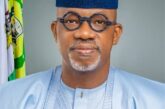
An encounter with Dr Moyo Kasim, Provost of the famous Lagos State College of Health Technology fondly called LASCOHET, is an interviewer’s delight.
There isn’t a dull moment as he goes down memory lane recalling the heydays of the renowned tertiary health institution and it’s current successes and contributions towards taking Nigeria’s healthcare sector to the next level.
Dr Kasim, a Lagosian that hails from Epe township, is the first bonafide provost of the institution since it was founded. Married to Rolake Olagbegi, Nigeria’s tennis sensation in the 80s & 90s, from the Royal family in Owo, Ondo State and one of the daughters of the famous Olateru Olagbegi, Olowo of Owo who was blessed with more than 50 graduates as children, Dr Kasim is also a sports enthusiast. He played volleyball up to professional level in France before concentrating on his medical career in the United States.
From being the first medical health technology institution in Nigeria to offer full online courses to tackling brain drain through skills acquisition, Dr Kasim has positioned LASCOHET in the right direction.
In this interview with Saturday Vanguard, he speaks about the exploits of the College which is on track to achieve its dream to be a premier destination for excellent learning, producing world class allied healthcare professionals. Excerpts:
First in Nigeria
The Lagos State College of Health Technology is the first in the country. It was founded in 1920 by the late Dr Isaac Oluwole, long before many of the other tertiary health institutions. That was during the colonial era when we had the ‘wole wole’ or sanitary inspectors. They are now called environmental health officers.
Our vocation at the school of health technology is different because we deal with human life and this stands us out from the others. The College is a monotechnic because it focuses only on health. All of the courses that are offered here relate to health and healthcare delivery.
Students are admitted through JAMB and also through an entrance examination done at the College. Admission is strictly by merit. Applicants must have 5 credits at not more than two sittings and the courses are health based so that successful applicants must have Mathematics, English, Chemistry Biology and Physics.
Health-focused programmes
Currently, we are running programmes that include environmental health, pharmacy technician programme, community health programme, complementary health programme, morbid sciences, paramedics, equipment technicians programme, and medical laboratory technogy programme amid others. We have about 12 other programmes in the pipeline and also there are courses such as those for the first responders, utrasound, school of sonograpy, x-ray dental therapy, medical therapy technology, and a number of others that are all coming on board.
The state Governor, Mr Babajide Sanwo-Olu, through his Special Adviser on Education has been quite supportive of the College. The state government is constantly giving financial and moral support. In addition, the infrastructural development has really been tremendous,
Mr Govenor has given us much hope and we appreciate the effort, assistance and support. We have a lot of resources and constructions going on to enable expansion to introduce programmes that Lagos needs for its healthcare.
Upgraded system
When I came in as Provost initially, the College was running on a standard that I was not comfortable with. There were several challenges and one of the most glaring was that people, particularly outside the country, did not trust our transcripts, so when I came in, I decided that the grading system needed to be changed.
At that time, a score of 40 percent was the pass mark, but I was not satisfied with that. I said it was not right and argued that even though it was the accepted system at that time, it had to be changed. We eventually changed the grading system and this has upgraded the standard of the College.
Now, to earn a learned Grade A in any quiz or test, a student in the College must score 90 -100 percent. For a learned Grade B, you must score 80-89 percent; to earn a learned Grade C, a student must score 70-79 percent; and to earn a learned Grade D, the student must score 60-69 percent.
It is crucial that a student should not have too many “Ds” because in order to graduate from the College, your CGPA must be 2.0 and above, but if you are having more than two Ds there is no way your CGPA can measure up. As it is now, a score below 60 is an “F” and the student would have to repeat that course, or have a reference.
Initially the students protested when we changed the grading system, but through the intervention of the state Governor, this new system was gradually accepted, and now things have changed for the good.
Now we are having students from all over the world that are coming back to Nigeria and coming to thank the College for upgrading the grading system because it is now, the graduates of the College are more accepted than in the past according to best practices globally.
-Vangauard




